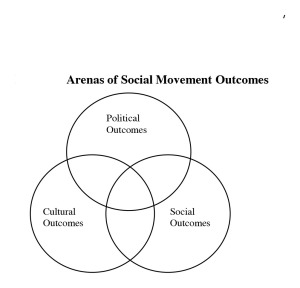A number of different jurisdictions do a form of “Change Day” for healthcare. The NHS Change Day will take place this year on Wednesday 11th March 2015.
This year, Andy Tysoe will be spearheading efforts for a ‘change’ in how the general public perceive dementia – please do support @DementiaBoy and #DementiaDo.
How you measure outcomes as well as short term benefits for NHS Change Day is to be itself an outcome of a study shortly. But I do find interesting the basic issue of how social movements are deemed to have had any effect or not.
I took as a useful starting point this document.
This is a graduate thesis from 2008 entitled, “Arenas of social movement outcomes: accounting for political, cultural, and social outcomes of three land-use social movements” by Brandon C. Hofstedt at Iowa State University.
The actual number of pledges in itself is clearly not the factor. “Targets” have been pervasive in English dementia policy wherever you look, such as the number of people enrolled into research studies, or the number of new diagnoses of dementia. But, coupled with the fact that shrewd people can effectively ‘game’ such metrics, together with the more underlying issue that quantity does not necessarily equate to policy, the number of pledges about dementia is not THE measure.
Last year, there was a very successful ‘Whose Shoes’ campaign with Ken Howard, living with dementia, which explained what it was like to receive a diagnosis of dementia, and what it was like to live with that diagnosis. But was that in itself a game changer? The initiative certainly did open many people’s eyes, and it was extremely well received; but did it change everyday practice in the NHS?
It is well known that the disclosure of dementia in the NHS can be extremely poorly done. One aspect is the rushed nature of the appointment for that disclosure, as well as the lack of supporting follow-up. But, as Chris Roberts, living with a mixed vascular dementia and Alzheimer’s disease, remarks, a more systematic imparting of the diagnosis, perhaps divided up into pre-disclosure, disclosure, post-disclosure parts might be more helpful. This is, in fact, the structure adopted for the disclosure of a diagnosis of Huntington’s disease.
The diagram below is taken from the thesis above.
We know that social movements all have lifespans of their own, and it can take a long time after the existence of a social movement for the effects of that social movement to become known.
But even in the lifetime of the recent NHS Change Day campaigns on dementia it is worth examining whether there has been a fundamental change in dynamics in political, social, or cultural domains.
In terms of global policy, this month the Alzheimer’s Disease International and World Health Organization, consistent with previous policy strands from the G7dementia and World Dementia Council, will be fleshing out the key tranches in policy, which are in prevention and the search for a cure. In fact, policy, including social care, for people living well with dementia currently has not been given as high a priority, it can be argued. Despite devastating social care cuts in England, the Prime Minister recently boasted of how England should be known as “the best place to receive a dementia diagnosis”.
Social capital is essentially about looking at the power of individuals relate to each other, and cultural domains reinforces this notion, looking at what ‘cultural norms’ are. “Dementia Friends” has so far cost a few millions, but some believe it is money well spent for offering the general public basic information awareness of what the dementias are. Such information, it is argued, is that the first step to breaking down stigma and discrimination.
But no initiative on its own, even with the backing of ‘Dementia Friends’, can be expected to be wholly transformative in changing cultural ideas around.
That is where, perhaps, the particular strength of Andy Tysoe’s present campaign lies for NHS Change Day. The idea is that by gathering lots of ‘backers’ to his pledge, Andy can bring about a social movement encouraging people to think differently about dementia; and lots of pledges can make NHS Change Day a powerful force.
This indeed is formidable, but we should all be concerned if nothing fundamentally changes. There is only one person living well with dementia on the World Dementia Council, not even democratically elected on the World Dementia Council despite all the campaigning; and, there still remains the 30 minute rushed consultation in busy outpatients to explain the life changing diagnosis of dementia.
And you know the rest.





